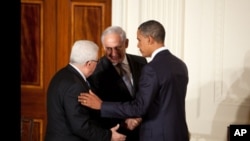With talks to end the simmering Palestinian-Israeli conflict once again at an impasse, recent surveys of Israeli and American public opinion show majorities in both countries support a continued, active U.S. role in keeping those talks going, and achieving a peaceful settlement..
The surveys, conducted in October and November of 2010, revealed that three out of four of the nearly 1500 American respondents support the Obama administration’s mediation efforts with the Palestinians and Israelis. And according to survey director Sibley Telhami, Professor of Peace and Development at the University of Maryland, most Americans said they want the U.S. to be a fair and neutral arbiter in the peace talks.
"It is very striking how a majority of Americans believe that the Arab-Israeli peace is one of the top five interests for the U.S. Clearly the American public sees this as a central issue," he said. "Two thirds of Americans want the U.S. to be actively involved in diplomacy and want the U.S. to lean neither toward Israel nor toward the Palestinians."
Telhami says the survey reflects a growing public understanding in the United States of the importance of the proposed two-state solution, a central tenet of the negotiations that envisions Israel and a neighboring Palestinian state living at peace with each other.
While 41 percent of Americans believe the Obama administration’s efforts to resolve the conflict have been at the right level, thirty percent criticized the administration for not trying hard enough.
"I think what the public understands is that it is a central issue for the U.S. and it is a consequential issue for the U.S., an issue of national interest not just doing goodwill to the Israelis or the Palestinians. And they understand the consequences of failure and they want to see the U.S. succeed," said Telhami.
Telhami also conducted two other public opinion surveys among 500 Jewish Israelis and 600 Arab citizens of Israel. A solid majority of 63 percent of Arab Israelis and 47 percent of Jewish Israelis said peace between Israel and Palestine will never happen.
But 62 percent of Israelis believe Israel should do more to promote comprehensive peace with the Arabs, embracing not only the establishment of a Palestinian state but also some negotiated modifications to Israel’s pre-war 1967 borders with its Arab neighbors. And, a majority of Jewish Israelis said they regard the Obama administration’s efforts to mediate a settlement of the conflict as a central concern in their lives.
"You find on the one hand openness to peace and on the other hand pessimism and thirdly, no alternatives," he said. "For that reason, in some way, the [American and Israeli] publics are asking for somebody to deliver. I think it puts a lot of burden on not only the local leaders of Israelis and Palestinians but particularly the international community -- especially on the U.S. as the major mediator in this process."
Steven Kull, the director of the University of Maryland’s Program on International Policy Attitudes believes this survey, like other recent polls, conveys a strongly positive message from the American public to the Obama administration.
"There is a kind of stick-with-it message, if you look at all of the polling data from multiple sources," he said. "There are signs that Americans are basically backing the U.S. taking a stronger hand and trying to be more even-handed -- but also to be more ready than U.S. foreign policy has been to put pressure on Israel."
On that point, Kull says a growing number of Americans regard an Israeli-Palestinian peace as an urgent U.S. national security goal, since the conflict continues to inflame anti-U.S sentiment throughout the Arab and Islamic worlds. Many younger Americans, Kull says, believe that in solving this decades-old territorial dispute, the United States must not shrink from pursuing its own security interests, even as it pursues security for Israel and justice for the Palestinians.
Israelis, Americans Support Mideast Peace Efforts, Polls Show




